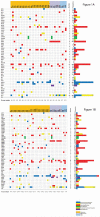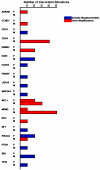Concordance of genomic alterations between primary and recurrent breast cancer
- PMID: 24608573
- PMCID: PMC4348062
- DOI: 10.1158/1535-7163.MCT-13-0482
Concordance of genomic alterations between primary and recurrent breast cancer
Abstract
There is growing interest in delivering genomically informed cancer therapy. Our aim was to determine the concordance of genomic alterations between primary and recurrent breast cancer. Targeted next-generation sequencing was performed on formalin-fixed paraffin-embedded (FFPE) samples, profiling 3,320 exons of 182 cancer-related genes plus 37 introns from 14 genes often rearranged in cancer. Point mutations, indels, copy-number alterations (CNA), and select rearrangements were assessed in 74 tumors from 43 patients (36 primary and 38 recurrence/metastases). Alterations potentially targetable with established or investigational therapeutics were considered "actionable." Alterations were detected in 55 genes (mean 3.95 alterations/sample, range 1-12), including mutations in PIK3CA, TP53, ARID1A, PTEN, AKT1, NF1, FBXW7, and FGFR3 and amplifications in MCL1, CCND1, FGFR1, MYC, IGF1R, MDM2, MDM4, AKT3, CDK4, and AKT2. In 33 matched primary and recurrent tumors, 97 of 112 (86.6%) somatic mutations were concordant. Of identified CNAs, 136 of 159 (85.5%) were concordant: 37 (23.3%) were concordant, but below the reporting threshold in one of the matched samples, and 23 (14.5%) discordant. There was an increased frequency of CDK4/MDM2 amplifications in recurrences, as well as gains and losses of other actionable alterations. Forty of 43 (93%) patients had actionable alterations that could inform targeted treatment options. In conclusion, deep genomic profiling of cancer-related genes reveals potentially actionable alterations in most patients with breast cancer. Overall there was high concordance between primary and recurrent tumors. Analysis of recurrent tumors before treatment may provide additional insights, as both gains and losses of targets are observed.
Figures



References
-
- Juric D, Argiles G, Burris H, Gonzalez-Angulo A, Saura C, Quadt C, et al. Phase I study of BYL719, an alpha-specific PI3K inhibitor, in patients with PIK3CA mutant advanced solid tumors: preliminary efficacy and safety in patients with PIK3CA mutant ER-positive (ER+) metastatic breast cancer (MBC) Cancer Research. 2012;72 P6-10-07.
Publication types
MeSH terms
Grants and funding
LinkOut - more resources
Full Text Sources
Other Literature Sources
Medical
Research Materials
Miscellaneous

